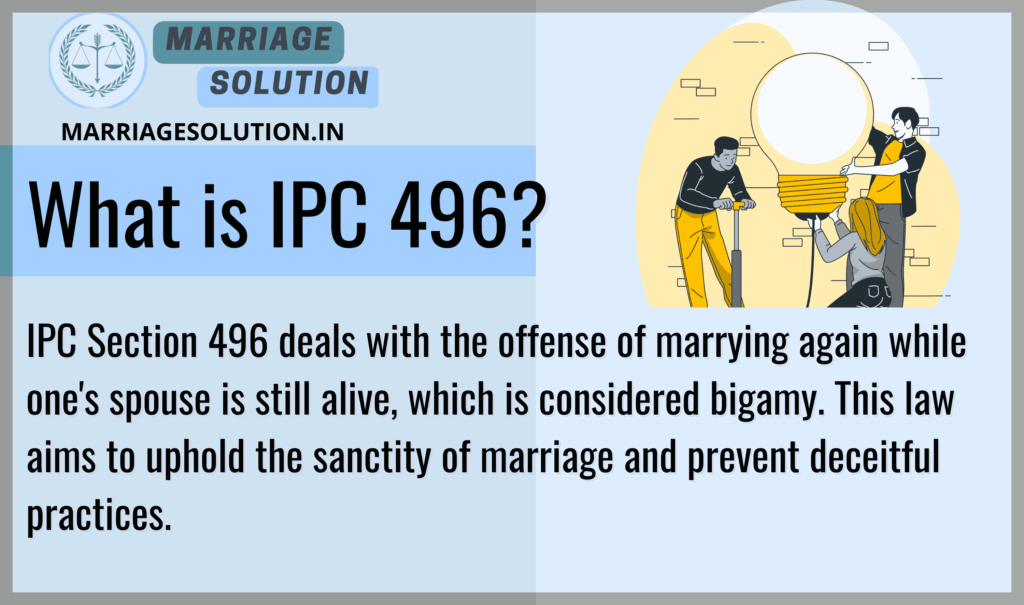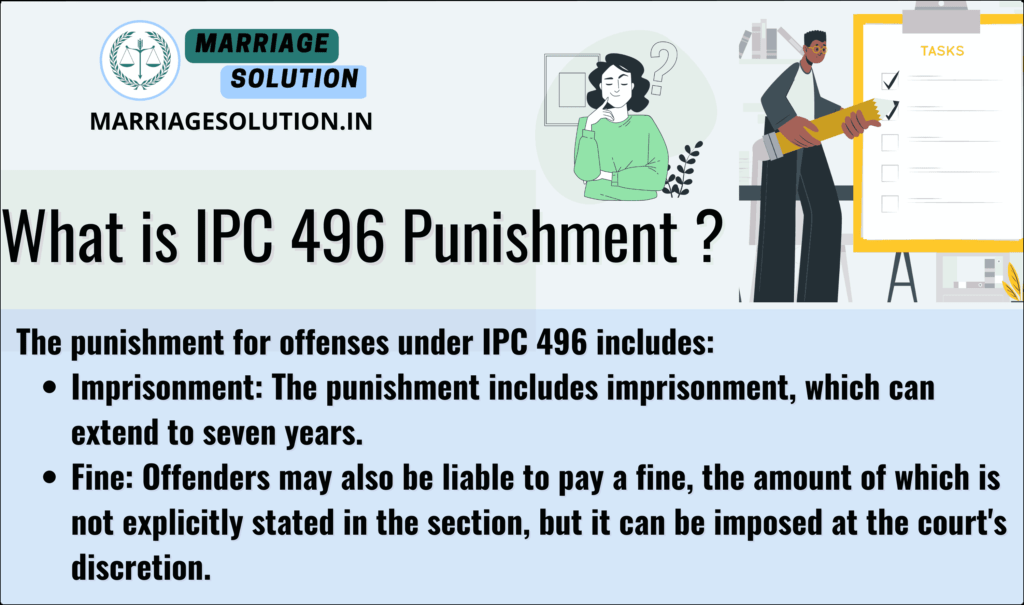Introduction of IPC Section 496
IPC Section 496 pertains to the prohibition of remarriage while one’s spouse is still alive. This law aims to preserve the sanctity of marriage and prevent fraudulent or deceitful practices.
What is IPC Section 496 ?
IPC Section 496 deals with the offense of marrying again while one’s spouse is still alive, which is considered bigamy. This law aims to uphold the sanctity of marriage and prevent deceitful practices.

Section 496 IPC Explained
IPC Section 496 says that if someone hides the fact that they are already married and marries someone else, they are breaking the law. This is to prevent dishonesty and protect the rights of married couples.
Key Points About IPC Section 496:
- Definition of the Offense: IPC Section 496 prohibits marrying again while one’s spouse is alive, irrespective of whether the first marriage is dissolved or not.
- Purpose of the Law: The primary objective is to preserve the integrity of marriage and prevent individuals from entering into multiple marriages simultaneously.
- Legal Consequences: Violating IPC Section 496 is a criminal offense punishable with imprisonment and/or fine.
- Bailable Status: IPC 496 is generally considered a non-bailable offense, meaning the accused may have to seek bail from the court.
- Nature of the Offense: It is a cognizable and non-compoundable offense, indicating that it can lead to immediate arrest without a warrant, and the complaint cannot be withdrawn.
- Legal Protection: This section provides legal protection to spouses by ensuring that marriages are respected and not undermined by deceitful conduct.
496 IPC Punishment
- Imprisonment: The punishment for the offense under IPC 496 can extend up to 7 years.
- Fine: Additionally, the offender may also be liable to pay a fine as determined by the court.

496 IPC bailable or non bailable ?
IPC 496 is typically regarded as a non-bailable offense. This means that individuals accused of violating IPC 496 do not have an automatic right to bail and must apply for it in court. Whether bail is granted or not depends on various factors, including the severity of the offense and the specific circumstances of the case.
Section 496 IPC in short information
| Aspect | Details |
|---|---|
| Definition | IPC Section 496 prohibits individuals from marrying again during the lifetime of their spouse. |
| Offence | Marrying again while one’s spouse is still alive. |
| Punishment | Imprisonment 7 Years and/or fine. |
| Bailable | Generally considered non-bailable. |
496 IPC FAQs
What is IPC 496?
IPC 496 deals with a specific type of marriage-related offense: marrying someone who is legally incapable of giving consent due to being underage or of unsound mind.
3. What is the punishment for IPC 496?
The offender can face imprisonment for up to 7 years and a fine (amount decided by the court).
What are the legal consequences of remarrying while my spouse is alive?
Remarrying while your spouse is alive is a criminal offense and can result in imprisonment and/or fine.
Is there any exception to this law?
No, IPC Section 496 applies universally, and there are no exceptions for specific circumstances.
If you need support with court proceedings or any other legal matters, don’t hesitate to reach out for assistance.
Court or any other marriage-related issues, our https://marriagesolution.in/lawyer-help-1/ website may prove helpful. By completing our enquiry form and submitting it online, we can provide customized guidance to navigate through the process effectively. Don’t hesitate to contact us for personalized solutions; we are here to assist you whenever necessary!
